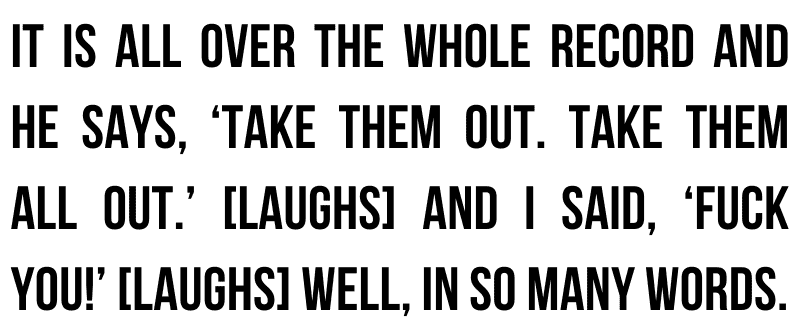In a recently published interview with Music Radar, guitar legend Steve Vai remembered one occasion when a label representative told him to get rid of all the pinch harmonics from a recording that he was doing. Although he didn’t give any names, Vai explained that this was for a “big band” and that an A&R, or “artist and repertoire,” was pretty direct in showing his disdain about it.
The interview in question focused on Vai’s album with vocalist Johnny “Gash” Sombrotto which was recorded in the 1990s and is only seeing the light of day now. When asked about what it was like to work with a vocalist like Gash and whether he needed to give more space to him, Vai replied:
“Yeah, you have to keep all these things into account, and my focus on a project like this has parameters. Just like my focus on ‘Flex-Able‘ had parameters, and ‘Passion And Warfare,‘ ‘Sex And Religion,‘ and the orchestra music that I do, you apply parameters to create flavour, and with the Gash record, I didn’t want to be the Steve Vai that got in the way of the vocal. It needed to be really powerful.”
He continued:
“Now, I love playing rock rhythm guitar like that. It is freedom. It feels so good, and I nail that shit back then. I could eat that shit for breakfast. You just gimme it and I’m gonna have so much fun with it. That was something that I wanted to do on this record. The concept was every song, straight ahead, big guitars, no excuses, no frills.”
Going more into it, Vai added:
“The difference between this record and all of the other records I made outside of my solo work is every decision had a committee involved in it. ‘What song? Okay, you’re the guitarist, Steve. How does the rest of the band feel about what you are doing? How does the leader of the band feel?’ The producer has a lot of say, the engineer, and then the label. ‘Oh, we don’t like that one. Do another one. Do this song.’“
While discussing the whole thing, Vai recalled this odd incident with an A&R guy trying to meddle in his work. He said:
“I had an A&R guy come into the studio of a big band I was recording with, and I was playing harmonics. Now, you know what a harmonic is; it’s a squeal. It’s part of my style. It’s part of most guitar players’ styles. And he goes, ‘What’s that?’ And I go, ‘Oh, it’s a harmonic. You pinch it with your finger and…’“
“And he goes, ‘No, don’t do that. It sounds like a dying whale.’ And I said, ‘It’s a pinch harmonic!’ And goes, ‘Well take it out. Take it out.’“

“It is all over the whole record and he says, ‘Take them out. Take them all out.’ [Laughs] And I said, ‘Fuck you!’ [Laughs] Well, in so many words.“
Comparing that whole incident to working on the “Vai/Gash” album, he said:
“When I made the Gash record, it was a committee of one. Me. I go into the studio, lock the door, and create this beautiful wall of elegantly loose-but-tight rhythm guitar. It feels good. Big, hairy guitars, everybody loves it.”
Going more into the album and what he aimed to do with it, Vai said:
“You gotta remember, I was making this record for us to listen to while we were riding, and it was, ‘What an I gonna love?’ And I think I was listening to Radar Love, and I love the energy of that track, but there were a lot of in between bits that dragged it out.“
“And this is how a lot of people write songs. You get inspired by something you hear and then you craft around it, but I liked the way Busted slams.”
Obviously, this album has been sitting on a shelf for a while so it’s sort of like a time capsule. It’s a window to another moment in time when it had a completely different context in the music industry. When the interviewer mentioned that you couldn’t really make a record like this now, Vai replied:
“Yeah, ‘cos my psychological makeup has evolved over the last 30 years, and I think it is a good point that you made because I don’t think I could go back there just like that, psychologically. I could, but something else would come out.”
Reflecting on the whole nostalgia aspect of it, Vai said:
“Isn’t it nice to be able to look back and have that experience, of the last day of school, and the new Van Halen or whatever. For me it was Led Zeppelin. Yeah, that’s nice, and when I listen to this record, I’m there. It kinda gives you an opportunity to give yourself a little nostalgic hernia.”
He also added:
“Contemporarily, if you try to recapture the glory days of yore, you don’t have that innocence, which is what you said. When I recorded this record, when Led Zeppelin recorded, there is a creative innocence, and an almost bombastic call to freedom that you feel internally at that age in your 20s, your early 30s.”
“You are damn well going to make it real and nobody is gonna stop you, and it is going to be what you want. You just do it and you don’t care. At 62, I do that, but not like that. I do it with things like the Hydra! That’s my idea of a 62-year-old freedom-loving Steve Vai! [Laughs]”
Asked about whether he recalls the guitar and gear that he used for this album, Steve said:
“Now, this is just my recollection but I believe the guitar at the time was EVO [Vai’s white Ibanez JEM signature guitar], because I am pretty sure I had it because it was my motorcycle days and that is how I named EVO, after the Evolution [engine] of a Harley.
“The amp sounds to me like my Bogner. And I think it was that period. But Jonathan, there was no thinking involved in making this record. I just went, grabbed the guitar, ‘Roll the tape! Let’s get this done! I wanna get on the road and listen to it.’ Solos? One take. No fucking around. All right, let’s go.”
Photo: Alterna2 (Steve Vai en Barcelona, Sala Barts (28353769132))


